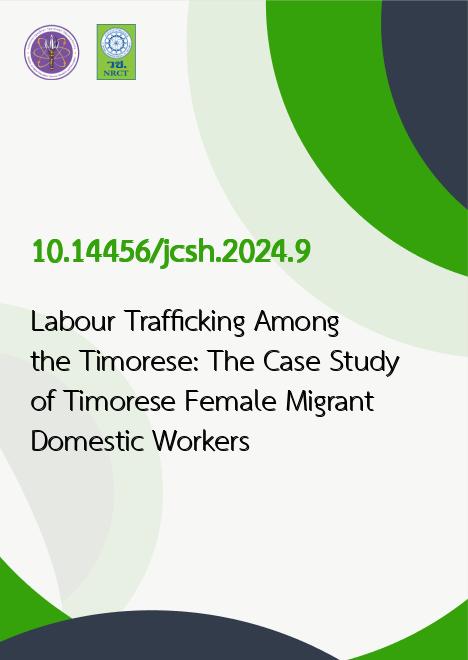
|
Labour Trafficking Among the Timorese: The Case Study of Timorese Female Migrant Domestic Workers |
|---|---|
| รหัสดีโอไอ | |
| Creator | Ezolina Maria Lobo Mascarenhas Pinto |
| Title | Labour Trafficking Among the Timorese: The Case Study of Timorese Female Migrant Domestic Workers |
| Contributor | Sasiphattra Siriwato |
| Publisher | Rangsit University |
| Publication Year | 2567 |
| Journal Title | Journal of Contemporary Social Sciences and Humanities |
| Journal Vol. | 11 |
| Journal No. | 2 |
| Page no. | 1-21 |
| Keyword | Labour Trafficking, Human Trafficking, Timorese Female Migrant Domestic Workers, Trafficking in Persons |
| URL Website | https://jcsh.rsu.ac.th |
| ISSN | 2985-055X |
| Abstract | Labour trafficking is a situation where victims are forced to work against their own will, under the threat of violence, other forms of punishment, or death. About 27.6 million people are found in forced, bonded, or child labour and sexual servitude globally. One group that is often victimized in this illegal trade are migrant domestic workers. This study examines the causes and factors of labour trafficking among Timorese female migrant domestic workers and what recommendations are possible to eradicate the problem in Timor-Leste. Semi-structured interviews were employed with 8 participants to collect the necessary information. There are three main factors that caused the labour trafficking situation of the Timorese female migrant domestic workers. The first cause is the ongoing high cost of living in Timor-Leste which serves as the primary push factor for migration. The second cause is the lack of domestic employment opportunities for women who are already in a tight competition with the available male workforce, and the last one is the lack of awareness and education among the Timorese population about the nature of labour trafficking and their vulnerability against persuasive traffickers. This study proposes three recommendations. The first is to encourage livelihood and skills training programs for locals and former migrant workers. The second is to create more domestic jobs through investment with local businesses and international or multi-national companies. The third and final recommendation is to intensify information drive campaigns in localities and boost training among law enforcement authorities to effectively discharge their duty. |